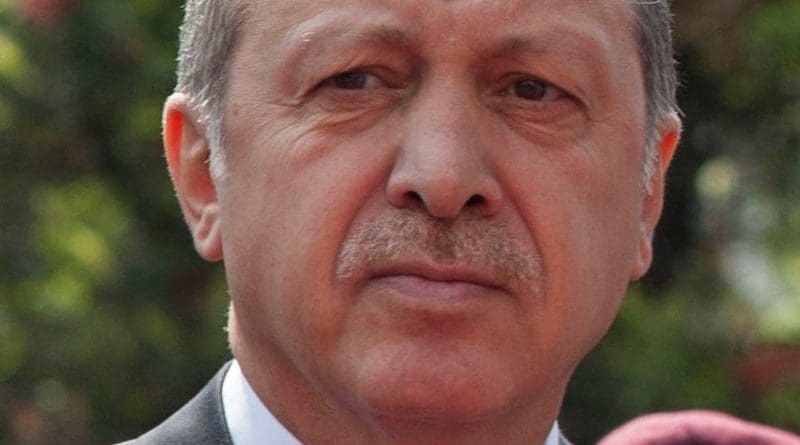Erdogan’s Gulf Tour And Expectations – OpEd
By Arab News
By Sinem Cengiz*
Turkish President Recep Tayyip Erdogan will be on a four-day Gulf tour, during which he will visit important countries of the region. Political and economic relations, as well as regional issues — particularly the conflict in Syria and chaos in Iraq — will be on his agenda.
The visit could be considered a continuation of Erdogan’s significant meetings with foreign leaders. Last month, he paid a four-day visit to three eastern and southern African countries. Following his return to Turkey, British Prime Minister Theresa May became the first Western leader to visit him since last year’s failed coup attempt. This was followed by German Chancellor Angela Merkel’s visit this month.
Days before Erdogan’s Gulf tour, CIA Director Mike Pompeo visited Turkey, his first trip abroad under the new administration of US President Donald Trump. Ankara, which was frustrated with the previous administration, is seeking a fresh start with Washington. The same goes for Saudi Arabia, another US regional ally. So relations with the new administration are likely to be discussed between Turkish and Gulf leaders.
Also this week, Russian President Vladimir Putin ratified the Turk Stream pipeline deal to take natural gas from Russia to Europe via Turkey. Meanwhile, Turkey’s Culture and Tourism Minister Nabi Avcı visited Israel, the first high-ranking Turkish official to do so since the rapprochement between Ankara and Tel Aviv.
In light of all these visits, meetings and agreements, Erdogan’s Gulf visit gains significance. Turkish government and Syrian rebel sources on Wednesday said Ankara-backed forces had taken the outskirts of Al-Bab, northeast of Aleppo. During his meetings, Erdogan will seek support from Turkey’s Gulf allies regarding its position on Syria. The Saudi and Qatari approaches on Syria are particularly crucial for Ankara.
Turkish interest in the Gulf has risen significantly in the past few years. It has political and economic motives behind its close relations with the region, which provides fertile ground for Turkey’s strategy of having an influential presence in the entire region.
Besides political issues, economy plays a vital role in Turkish-Gulf ties. This week, the Saudi-Turkish coordination council held its first meeting in Ankara under the chairmanship of Foreign Minister Mevlut Cavusoglu and his Saudi counterpart Adel Al-Jubeir.
While there are bilateral military and economic agreements, both countries seek to boost trade further. Saudi firms have significant investments in the Turkish defense industry, and this week the new Saudi ambassador presented his letter of credentials to Erdogan.
Also this week, senior Turkish and Emirati officials met in Ankara to discuss economic and trade relations between their two countries, which recently broke the ice after a cooling of ties due to differing positions on the military coup in Egypt in 2013.
Under King Salman, Turkish-Saudi relations have entered a new phase. He and Erdogan have frequent phone calls and are on the same page regarding regional issues.
Turkey and Qatar enjoy good relations. Almost every month, Qatari Emir Sheikh Tamim bin Hamad Al-Thani is in Turkey to meet with officials. Besides several bilateral agreements, these frequent visits demonstrate how the Ankara-Doha partnership has grown beyond trade and common diplomacy.
Qatar and Saudi Arabia were the first countries to stand by Turkey following the failed coup attempt. This was important for Erdogan amid weak reaction from traditional Western allies, with whom mutual distrust has increased recently. Also, the six-member Gulf Cooperation Council (GCC) became the first international organization to designate the Gulen movement as terrorist. The absence of the movement’s schools in Gulf countries is a relief for Ankara.
During his visit, Erdogan is expected to once more raise the issue of a free-trade agreement between Turkey and Gulf countries that would help regional development, and reiterate his call for Arab investment in Turkey.
Investments from Gulf countries, including real-estate purchases by their nationals, has a significant impact on Turkey’s economy, which is struggling due to growing terrorist acts. Gulf money is considered an alternative to investment from the West.
So during his tour, Erdogan will seek Gulf support for Turkey’s position on Syria, explain domestic developments since the failed coup attempt, and seek Gulf support for Turkey’s struggling economy and ways to boost tourism in the country. In consideration of all these expectations, Turkey seems to be showing that its relations with the Gulf are part of a long-term strategy.
*Sinem Cengiz is a Turkish political analyst who specializes mainly in issues regarding Turkey’s relations with the Middle East. She can be reached on Twitter @SinemCngz.

